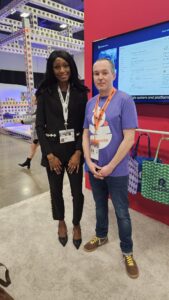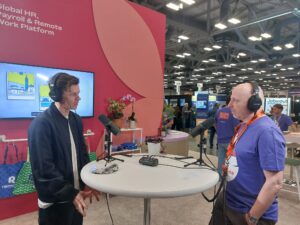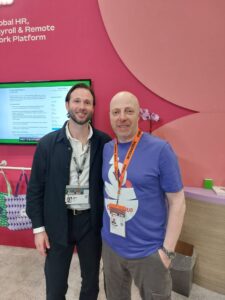
chatting with Dan Clancy, Twitch
At SXSW, Graham Barrett leads a conversation with Dan Clancy, the CEO of Twitch, offering attendees an insightful glimpse into the multifaceted world of live streaming. Together, they explore Twitch’s journey from its origins as a platform primarily for personal streaming to its status as a powerhouse in the live streaming arena. Dan sheds light on the platform’s transformative phases, emphasising its evolution from a gaming-centric space to a hub encompassing various content genres. Notable Twitch personalities like Mizkif, ExtraEmily, and SushiDragon are highlighted as exemplars of the platform’s diverse creator base, each contributing unique and engaging content to the Twitch community.
Dan provides intriguing insights into Twitch’s foundational principles and its recent resurgence in lifestyle streaming. He reflects on Twitch’s initial focus on personal streaming, its pivot to gaming-driven content, and the current trend towards lifestyle streaming, where creators share their real-world experiences with audiences. Drawing from his expertise in AI, Dan discusses the potential for technology to enhance creators’ interactions with their audience, augmenting rather than replacing the crucial human element of live streaming.
Throughout the discussion, the importance of community and collaboration within the Twitch ecosystem is underscored. Dan shares Twitch’s initiatives to foster a sense of belonging among creators, emphasising the platform’s efforts to facilitate collaboration and engagement. He highlights Twitch’s commitment to providing tools and resources that empower creators to connect with their audience meaningfully, fostering vibrant and supportive communities.
Looking towards the future, Dan discusses Twitch’s priorities, particularly focusing on enhancing collaboration between streamers through innovative technology. He anticipates continued growth and innovation within the live streaming space, driven by the boundless creativity of Twitch creators.

Graham with Marcelo Lebre (left)
Marcelo Lebre, President of Remote, joins Graham in a discussion shedding light on the rapid evolution of remote work and Remote’s pivotal role in this landscape. Marcelo reflects on their recent talk, emphasising insights shared with Masha Bucher and the strategic vision behind Remote’s growth, notably its transformation from an employer of record to a comprehensive HR solution for distributed organisations worldwide. He has a lot of excitement surrounding Remote’s expansion, with a surge in new hires and ongoing product developments propelling the company to new heights, promising even more transformative capabilities in the future.
Marcelo delves into the cultural ethos at Remote, emphasising the company’s pragmatic approach to fostering a positive work environment rooted in transparency and employee happiness while maintaining a focus on profitability. He astutely observes the changing expectations of modern workers, driven by increased transparency and the ease of changing jobs in a remote setting, underscoring the importance of aligning work environments with employee fulfilment.
A particularly intriguing aspect of their conversation revolves around the integration of AI into Remote’s operations. Marcelo highlights AI’s dual role in enhancing internal efficiency and improving customer offerings, offering a glimpse into the inevitable transformation of workplaces as they adapt to AI-driven changes. Despite the challenges posed by these shifts, Marcelo exudes confidence in Remote’s ability to navigate and thrive amidst these transformations, underscoring the necessity of adaptation in an ever-evolving landscape.
Temitope Sadiku, Strategy, Transformation, Agile and Digital Revolution at Kraft Heinz

With Tope Sadiku
Graham is joined by Tope Sadiku, Strategy Planning Leader at The Kraft Heinz Company. Tope begins by discussing her participation in a session at SXSW titled “Kicking Our Workstation Habits to Improve Brain Health.” The session featured an academic researcher specialising in neuroscience, a representative from an architectural firm, and Tope herself, offering insights on applying these concepts in the workforce.
Tope delves into the concept of workstation habits, highlighting how traditional notions of productivity rooted in stationary workspaces may not align with modern knowledge work. She breaks down three main modes of work: focused deep work, collaboration, and creativity. Each mode necessitates different environments and stimuli for optimal performance.
The discussion then turns to remote work and its impact on workplace structure. Tope emphasises the importance of separating business objectives from physical locations, a lesson underscored by the pandemic. She explores how this shift encourages organisations to reassess their goals and methods of achievement.
Tope shares insights on fostering workplace culture in a multinational corporation like Kraft Heinz. She highlights the value of honouring and respecting diverse perspectives and backgrounds, drawing from her own multicultural experiences.
Looking ahead, Tope discusses potential future trends in the workplace, including the evolving gig economy and the integration of modern technologies like AI. She expresses curiosity about how these trends will shape the future of work and looks forward to being part of the conversation.

Russ with Eloise Singer
Russell Goldsmith welcomes Eloise Singer, the Creative Director and CEO of Singer Studios, to discuss her latest project, “The Pirate Queen,” a VR game starring Lucy Liu. Eloise shares the inspiration behind the game, recounting how she stumbled upon the true story of a fearless woman who became the most powerful pirate in history during the 19th century in China. Intrigued by the tale’s blend of adventure and gender equality advocacy, Eloise embarked on the journey to bring this remarkable narrative to life.
Although Eloise’s background lies in filmmaking, she delves into the challenges and learning curve of transitioning into game development. Originally conceived as a film project, “The Pirate Queen” took a new direction when the pandemic struck, leading Eloise to collaborate with gaming industry experts and launch the VR game.
Eloise also explores the competitive nature of talent acquisition in the industry. Eloise shares insights into how Singer Studios navigates this challenge by leveraging networks, industry resources, and recruiters to find the best talent for their projects.
As a female filmmaker and CEO, Eloise emphasises the importance of promoting women’s roles in both filmmaking and the gaming industry. With Singer Studios at the forefront of championing female-led narratives, Eloise is passionate about driving positive change in the industry’s landscape.
Looking ahead, Singer Studios has ambitious plans for “The Pirate Queen,” including the release of a podcast and graphic novel, as well as development into a film franchise. Eloise discusses the company’s vision of expanding “The Pirate Queen” into a cross-media franchise, breaking new ground in the VR gaming industry.
In conclusion, Russ extends his congratulations to Eloise on the success of “The Pirate Queen” and wishes her luck with the upcoming projects. Eloise expresses gratitude for the opportunity to share her journey and insights on the podcast, leaving listeners inspired by her innovative approach to storytelling and game development.

Chatting with Alex Wills of Disguise
Russ speaks with Alex Wills, the CXO of Disguise, to delve into the innovative world of immersive experiences and the cutting-edge technology behind them. Alex introduces Disguise as a visual experience platform, explaining how their hardware and software power immersive concerts, virtual productions, and broadcast studios. Notably, Disguise has been involved in major projects such as the Taylor Swift tour and the U2 residency, displaying their expertise in creating stunning visual spectacles on a global scale.
The conversation shifts to the intricate workings of immersive technology, with Alex providing insights into the role of LED panels, projections, and Disguise’s hardware and software in creating immersive environments. He elaborates on the process of mapping visual material onto LED walls or projections, highlighting real-time control and seamless integration for live shows and virtual productions alike.
As SXSW unfolds, Alex shares Disguise’s participation in displaying a virtual production studio at UK House in Austin. He recounts an immersive experience collaboration with Chrome Productions, offering attendees a glimpse into high-end film production through interactive exhibits.
Touching upon the topic of AI, Alex explores its potential impact on content creation and workflow optimisation within the immersive technology space. He envisions AI streamlining content creation processes, enhancing developer workflows, and facilitating user access to information, thereby driving innovation and efficiency.
Transitioning to talent acquisition, Alex discusses Disguise’s initiatives to address the industry-wide challenge of finding skilled professionals. He highlights Disguise’s virtual production accelerator program, aimed at upskilling talent globally and fostering innovation within the immersive technology sector. Alex also discusses upcoming projects, including Adele’s one-off concert in Munich, teasing Disguise’s involvement in the event.

with John Scott (left)
In the last interview of this episode, Russ sits down with John Scott, the Head of Learning Design and Strategy at Masterclass at Work, fresh off his presentation at SXSW. John sheds light on the captivating topic of how learning from individuals with diverse perspectives can enrich our soft skill development.
The conversation begins with an overview of Masterclass at Work’s focus on nurturing soft skills such as communication and leadership through storytelling. John highlights the power of storytelling as a timeless method of learning, drawing on ancient indigenous wisdom to underscore its effectiveness in captivating learners and fostering deeper engagement.
John delves into the essence of his recent talk, providing examples of how storytelling enhances skill acquisition. He highlights negotiation as a core skill and narrates how former FBI hostage negotiator Chris Voss’s anecdotes and techniques resonate with learners, offering practical insights applicable to various real-world scenarios.
John explores the role of storytelling as a catalyst for effective learning, with John underscoring the importance of integrating sound learning design principles to maximise impact. They delve into Masterclass at Work’s approach to leveraging content from the Masterclass consumer platform, aligning it with workplace needs to address pressing business challenges.
Touching on talent acquisition, John emphasises the significance of cultivating a strong organisational culture through storytelling to attract top talent. He shares insights into Masterclass at Work’s culture-building initiatives, leveraging video content to foster shared experiences and a sense of connection among team members.
As the discussion unfolds, John offers a glimpse into his personal exploration of Masterclass content, highlighting surprising lessons gleaned from diverse courses. He also highlights how AI-driven personalisation enhances the learning experience, enabling users to access tailored content aligned with their specific interests and learning goals.










